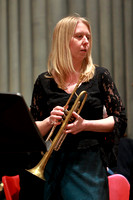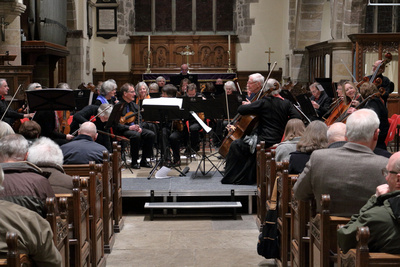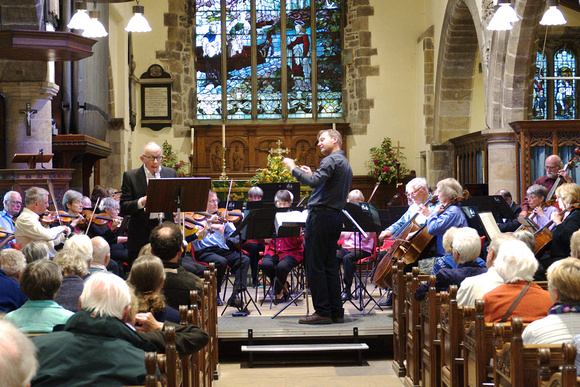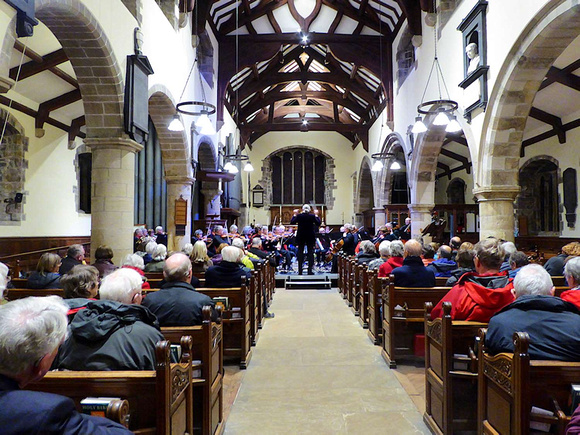SEDBERGH ORCHESTRA
Beyond the Steppes of Central Asia into Armenia and Russia. Thursday 8th March 2018
From the Sedbergh & District Lookaround. April 2018
Peter Crompton and the Sedbergh Orchestra are to be heartily congratulated. This was a bold, ambitious, courageous – and indeed, risky project. Khachaturian, Arutunyan, Mussorgsky, Borodin and Shostakovitch in a single night would have challenged even the most experienced professional instrumentalists and most distinguished ensembles. However, nothing ventured, nothing gained. This was another important and testing milestone in the Sedbergh Orchestra’s remarkable development. The musicians emerged triumphantly in the end.
Peter Crompton’s dynamic contribution to the Sedbergh Orchestra is clearly immense. He inspires, energises, cajoles, leads and encourages in equal measure. He also holds the orchestra together and obviously gives them great selfbelief .
On Thursday we were transported geographically across the Russian Steppes and beyond. Historically we were led through the Romanov dynasty, revolution, war, the soviet era, and perestroika. Musically the programme introduced us to a feast of lush harmonies, folksy melodies, pastoral interludes, crashing brass themes, haunting strings and woodwind sections and sleazy jazz motifs. What more could any audience wish for on a wet March night in the Howgill fells?
The evening opened with Khachaturian’s Masquerade Suite. It was a great introduction to what would follow. The Masquerade Suite was composed between 1941 and 1944 as incidental music for a Lermontov play. A subtle nocturne follows a loud and lively march. An exuberant waltz theme lies at the heart of the Suite.

 Alexander Arutunyan’s Trumpet Concerto was the highlight of the evening. It is a very interesting piece in that it was a political high wire act. Arutunyan had to get the Concerto past an array of Stalinist censors while at the same time seeking to achieve remarkable heights of virtuosity. His was a remarkable achievement as was Stella Crompton’s. This is a demanding piece, and she gave an amazingly authoritative performance, handling the complex rhythms and soaring cadences with great charm and sophistication. The pure, clear sound of Ms. Crompton’s trumpet reverberating around St Andrew’s Church against the disciplined, but muted strains of the Sedbergh Orchestra strings was a joy to hear. The audience was privileged, for Stella Crompton gave a truly memorable performance, and is a charismatic performer.
Alexander Arutunyan’s Trumpet Concerto was the highlight of the evening. It is a very interesting piece in that it was a political high wire act. Arutunyan had to get the Concerto past an array of Stalinist censors while at the same time seeking to achieve remarkable heights of virtuosity. His was a remarkable achievement as was Stella Crompton’s. This is a demanding piece, and she gave an amazingly authoritative performance, handling the complex rhythms and soaring cadences with great charm and sophistication. The pure, clear sound of Ms. Crompton’s trumpet reverberating around St Andrew’s Church against the disciplined, but muted strains of the Sedbergh Orchestra strings was a joy to hear. The audience was privileged, for Stella Crompton gave a truly memorable performance, and is a charismatic performer.
Modest Mussorgsky’s ‘Dawn on the Moscow River’ is a hauntingly atmospheric composition. It is the prelude to Khovanschina, a tragic opera set at the time of Peter the Great in seventeenth century Russia. By contrast to the dark, dramatic, often brutal scenes that unfold in the main work, Dawn on the Moscow River is a light, gentle, pastoral elegy, laden with tones and semi-tones evocative of the riverine landscapes of Mother Russia. The orchestra painted the scene with admirable restraint and deftness.
Alexander Borodin’s Polovtsian Dances provided an ideal foil to the serenely gliding Moscow River. The dances are the exotic climax to Act II of the opera Prince Igor. The Polovtsian Dances achieved instant fame at the hands of Sergei Diaghilev and his groundbreaking balletic interpretations at Ballet Russe. The Sedbergh Orchestra also rose to the challenge of these firecracker episodes. It is not easy to achieve an appropriate balance between brass, woodwind and strings in the constricted and asymmetrical performance area in St Andrew’s Church. Nevertheless, at key moments in the dances the lilting melodies and sonorous brass and woodwind themes managed to assert themselves excellently above the serried ranks of the strings. It was a fine performance.


The final item in the evening’s programme would have come as something of a surprise to anyone unfamiliar with the specific work. Waltz Number Two is unlike any of Shostakovitch’s more monumental compositions. In this piece the composer weaves a tapestry of alluring jazz sounds. He intended that the pieces could be played in any order. Some sections have a sinister feel, some are almost erotic, some are sleazy, and others are humorous. They are always engaging, always deeply musical and completely of their time. The Sedbergh Orchestra clearly relished the task. They managed to capture the atmosphere of the 1950s jazz scene in a remarkable way. They provided a sense of perpetual motion and, although the strings performed magnificently, this was a work that brought the best out in all sections of the Orchestra.
Finally, it should be acknowledged that this was a very tough call for the Sedbergh Orchestra – just as it would have been for any orchestra. However it was a risk worth taking. We, the audience, hope that the Orchestra will not shy away from new and even greater challenges in the future. Bravo!
Mike Leigh
Pictures courtesy of Peter Simms.
SEDBERGH ORCHESTRA
A Summer Sizzler
Sedbergh Music Festival Concert, Thursday 14th June 2018


A sizeable and enthusiastic audience turned up on Thursday 14th June 2018 to listen to Sedbergh Orchestra's summer concert as part of the Sedbergh Music Festival - and a sizzling concert it was, perhaps the best I have been to. After the opener of Rossini's Tancredi Overture, we were treated to the wonderful Mozart Oboe Concerto with the solo oboe part played beautifully by Philip Cull. After a leg stretch and some refreshments a sub-group of the orchestra played two pieces of 'Shed' music for wind quintet by Edward Elgar. The concert was rounded off with Schubert's Symphony No. 6 in C.
Speaking to Philip after the concert, he was full of praise for the orchestra - a delight to play with, so well drilled and well balanced with an especially fine wind section. The audience, orchestra members and Peter Crompton, the conductor, were equally full of praise for the soloist - the beatiful sound of his oboe and how easy he was to play with. Peter was delighted with the performance commenting on how well everyone played and how much they seemed to enjoy playing. Consequently, he had had a lot of fun.
Roll on the next Sedbergh Orchestra concert in November.
Review and photograph, Peter Simms, 17 June 2018
Sedbergh Orchestra Festival Concert, 14th June 2018
From the Sedbergh & District Lookaround. April 2018
A fine evening saw a sizeable audience assemble for the concert by the Sedbergh orchestra as part of the 2018 Sedbergh Music Festival.
The performance began with the rousing overture to ‘Tancredi’ by Rossini which provided a confident start to the programme. The following Mozart oboe concerto featured Philip Cull whose expressive and assured playing, from a treasured score, was accompanied sensitively by the orchestra.
By way of contrast , challenging pieces for the woodwind ensemble by Elgar opened the second half. This so-called “Shed ‘ music, apparently named because the composer worked in his father’s shed to create the pieces, provided an opportunity to showcase the woodwind section of the orchestra. After a wise restart, the players displayed humour and skill in these two compositions, with Philip Gruar providing a assured lead on the flute.
In the final piece, Schubert’s 6th Symphony, the whole orchestra demonstrated confidence and skill. Decisive playing in the violin section was evident ,accompanied by the solid assurance of the the cellos and bass. Added to this, depth was provided by the woodwind section, with the pleasing sound of the bassoons very much in evidence.
The whole orchestra was led by a conductor who was well in control. Peter Crompton knew what he wanted and how to get it, and the orchestra responded with expressive enthusiasm. It is to Sedbergh’s credit it can muster so able a group of musicians to enhance the Festival programme with such an enjoyable evening.
Diane Turner June 2018
SEDBERGH ORCHESTRA
The Nutcracker Suite and other music from Russia Thursday 29th November 2018

 Sedbergh Orchestra presented a lovely Russian programme at St Andrew’s Parish Church, Sedbergh on Thursday 29th November 2018. The programme was a mixture of familiar and favourite pieces by Glinka and Tchaikovsky, with a symphony by Kalinnikov, a composer new and refreshing to most of us in the audience.
Sedbergh Orchestra presented a lovely Russian programme at St Andrew’s Parish Church, Sedbergh on Thursday 29th November 2018. The programme was a mixture of familiar and favourite pieces by Glinka and Tchaikovsky, with a symphony by Kalinnikov, a composer new and refreshing to most of us in the audience.
The orchestra playing under the baton of Roland Fudge gave a wonderfully rounded performance with all sections showing off their skills. The woodwind and the strings particularly having become stronger in recent months.
The concert was completed with The Nutcracker suite making everyone feel that much nearer to Christmas. The Sugar Plum Fairy was sprinkling stardust everywhere.
Sue Bradley (Regular audience member and concertgoer)
Photo courtesy Stuart Manger
From the Sedbergh & District Lookaround. April 2018
There cannot be many places the size of Sedbergh that can boast its own symphony orchestra. We are lucky to have the Sedbergh Orchestra, which was founded in 2010 by Donald and Shirley Smith, and is a remarkably well-balanced group of some 30 to 40 players from the local area. They gave an interesting programme in St Andrew’s Church on Thursday evening November 29th under the expert direction of Roland Fudge. It was an evening of Russian music, starting with the overture to Ruslan and Lyudmila by Glinka. This has, to my mind, to be one of the most joyous beginnings in all music (along with Mendelssohn’s Italian Symphony). The orchestra obviously enjoyed this splendid piece and it was played with great panache. To follow we had a rarity – Symphony No. 1 by Vassily Kalinnikov, which was a revelation. It is full of Russian romanticism and so many dramatic and beautiful moments. There was some excellent playing by the wind section, especially in the lovely dreamlike second movement, which ends with a long series of pianissimo rising and falling thirds. The work ends with a tremendous climax and the players rose magnificently to the occasion. I am sure that everyone in the audience thoroughly enjoyed hearing this splendid work, which surely should be played more often. It was a great achievement. After the interval the orchestra played Tchaikovsky’s Nutcracker Suite. This is full of familiar and delightful tunes, but it seemed somewhat under-rehearsed. It was a brave effort, but I think that most of the rehearsal time had probably been spent on the Kalinnikov. Nevertheless, it was a highly enjoyable concert and they all deserve congratulations on their efforts. It was a pity that Donald and Shirley could not be there to hear it. Donald was ill with heart trouble in Manchester and Shirley was with him They would have been very proud of their orchestra. We trust that Donald is making a good recovery and is able to resume his place in the cello section.
Jennifer Thornely